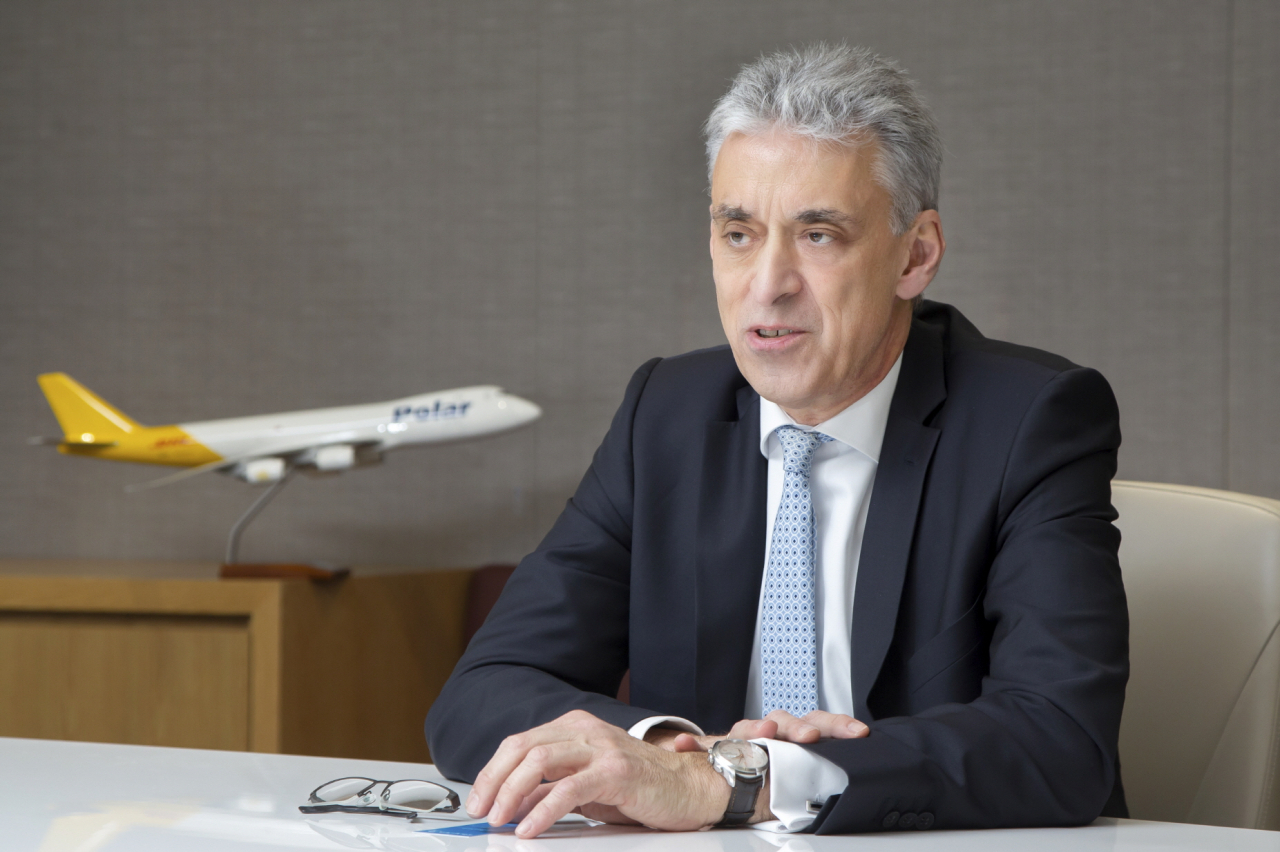 |
Deutsche Post DHL Group CEO Frank Appel speaks during a recent interview with The Korea Herald at the Korean headquarters in Mapo-gu, Seoul, Jan. 19. (DHL Korea) |
With the exponential growth of South Korea’s e-commerce market during the pandemic, Frank Appel, CEO of global logistics giant Deutsche Post DHL Group, has vowed to triple the company’s logistics capacity at Incheon Airport, the nation’s main gateway, this year.
“DHL base in Incheon is our key Asia-Pacific network that connects Singapore, Taiwan, Hong Kong, China and other major countries of imports and exports. This investment highlights the strategic position of South Korea in global logistics industry,” the CEO told The Korea Herald in a recent interview in Seoul.
“We have seen significant growth of e-commerce and logistics business here, which is expected to grow as the third-largest e-commerce market by 2023, following China and the US.”
Appel was visiting Korea last month as part of an inspection of overseas operations.
Under a 161 million euro ($173.7 million) investment, the 58,700-square-meter DHL Incheon Gateway will adopt cutting-edge logistics technologies including automated x-ray inspection and a freight classification system. It aims to increase its cargo handling capacity by 160 percent to 21,000 units per hour.
Appel, in particular, boasted the company’s extensive global logistics network and decades of expertise in customs clearance, which would help Korea’s smaller business owners seeking overseas expansion.
“Even if your company is based in Korea, you have potential customers in 220 countries and territories, where we’ve already set up service centers and airline connections,” said Appel.
“In case of Coupang, they might ship to major cities like Los Angeles, but not to small Asian countries, which have increasing demand for Korean products, sparked by K-pop phenomenon.”
Appel said that intercontinental e-commerce is showing faster growth than the domestic flow, because people have learned during the pandemic that it is safe and even helpful to use cross-border shipment services.
“Logistics has kept the world running for the past few years when nations had closed borders. We have delivered more than 2.5 billion COVID-19 vaccines in 177 countries, along with test kits,” he said.
Despite concerns that the e-commerce boom might be running out of steam in the post-pandemic era, Appel said the trend is here to stay in the long run, driven by both increased demand and supply, arguing consumers are fast adapting to online shopping while business owners seek to branch out overseas.
“It is inevitable for the online-centered retail industry to see normalization due to countries lifting lockdowns and social distancing measures, however, e-commerce is a long-term trend,” said Appel.
“Consumers have already experienced the convenience of buying a variety of products and getting a better deal online.”
Also, retailers must adopt multichannels -- both online and offline -- in order to survive the shift from stores to digital markets, said Appel.
“It is cost-effective to operate online marketplace because sellers do not necessarily operate stores at expensive prime locations,” he said.
He added that e-commerce also comes with more environmental benefits than offline shopping -- a smaller carbon footprint from warehouses to customer destinations.
Stressing sustainability and digitalization as key growth strategies, the CEO said DHL has committed several billions in euros to achieve net zero by 2050.
“By 2030, 60 percent of delivery vans will be running on electric power, and sustainable aviation fuel is expected to take up 30 percent of total fuel consumption of airlines including kerosene,” he said.
The DHL base at Incheon Gateway will also use solar panels and light-emitting diodes to reduce up to 1,500 metric tons of carbon dioxide annually.
As for digitalization, the company aims to inject 2 billion euros by 2025 to develop innovative and cost-effective logistics solutions and more transparent supply chains.
Joining DHL Group in 2000, Appel has served in diverse leadership positions. The CEO, who is also a member of the group’s board of management, has led the company since 2008.






![[Today’s K-pop] Blackpink’s Jennie, Lisa invited to Coachella as solo acts](http://res.heraldm.com/phpwas/restmb_idxmake.php?idx=644&simg=/content/image/2024/11/21/20241121050099_0.jpg)
